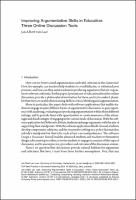Chapter Improving Argumentative Skills in Education: Three Online Discussion Tools
| dc.contributor.author | van Laar, Jan Albert | |
| dc.date.accessioned | 2022-06-01T12:22:47Z | |
| dc.date.available | 2022-06-01T12:22:47Z | |
| dc.date.issued | 2021 | |
| dc.identifier | ONIX_20220601_9788855183291_587 | |
| dc.identifier.uri | https://library.oapen.org/handle/20.500.12657/56402 | |
| dc.description.abstract | How can we foster sound argumentation and valid criticism in education? How to help students to avoid fallacies, resist polarization, respond wisely to misleading information, and how to make them produce arguments that are genuinely responsive to the position of those they address? I sketch a dialogical account of the nature of sound argument and criticism. Then, I discuss two types of argumentative dialogue: persuasion dialogue and negotiation dialogue. Finally, I explain how software applications provide an opportunity for students to analyse, evaluate and produce arguments, and to critically think about the design of discussion procedures. I also discuss a third software application that enables teachers and advanced students to themselves design online discussion procedures, so as to experiment with them and to advance their understanding of the advantages and disadvantages of various design choices. This paper support the idea that students’ argumentative skills will be enhanced by letting them engage in the online discussion procedures presented. | |
| dc.language | English | |
| dc.relation.ispartofseries | Communication and Philosophical Cultures. Researches and Instruments | |
| dc.subject.other | Argumentation Theory | |
| dc.subject.other | debate | |
| dc.subject.other | education | |
| dc.title | Chapter Improving Argumentative Skills in Education: Three Online Discussion Tools | |
| dc.type | chapter | |
| oapen.identifier.doi | 10.36253/978-88-5518-329-1.09 | |
| oapen.relation.isPublishedBy | bf65d21a-78e5-4ba2-983a-dbfa90962870 | |
| oapen.relation.isbn | 9788855183291 | |
| oapen.series.number | 1 | |
| oapen.pages | 12 | |
| oapen.place.publication | Florence |

